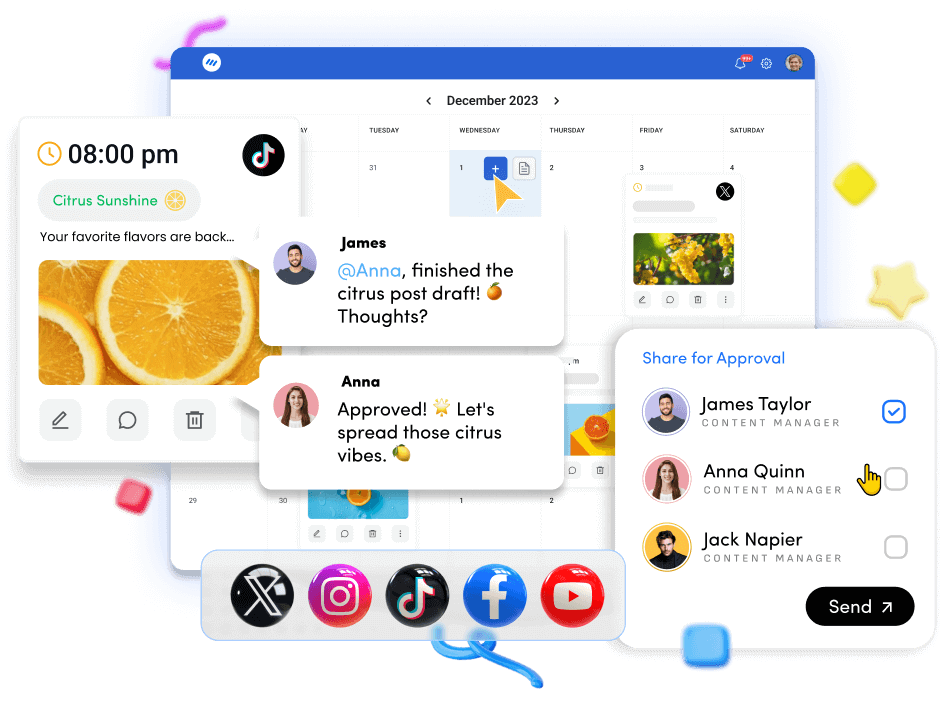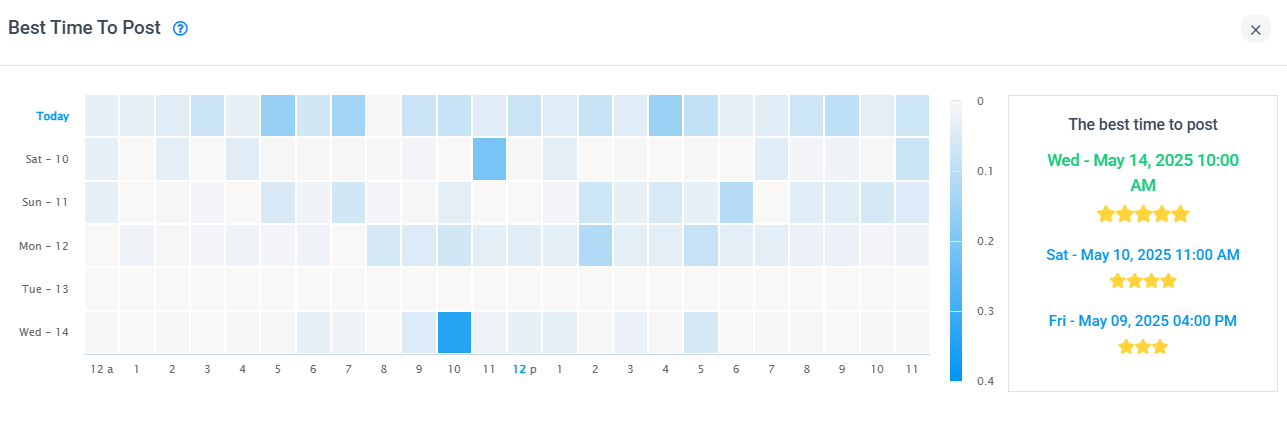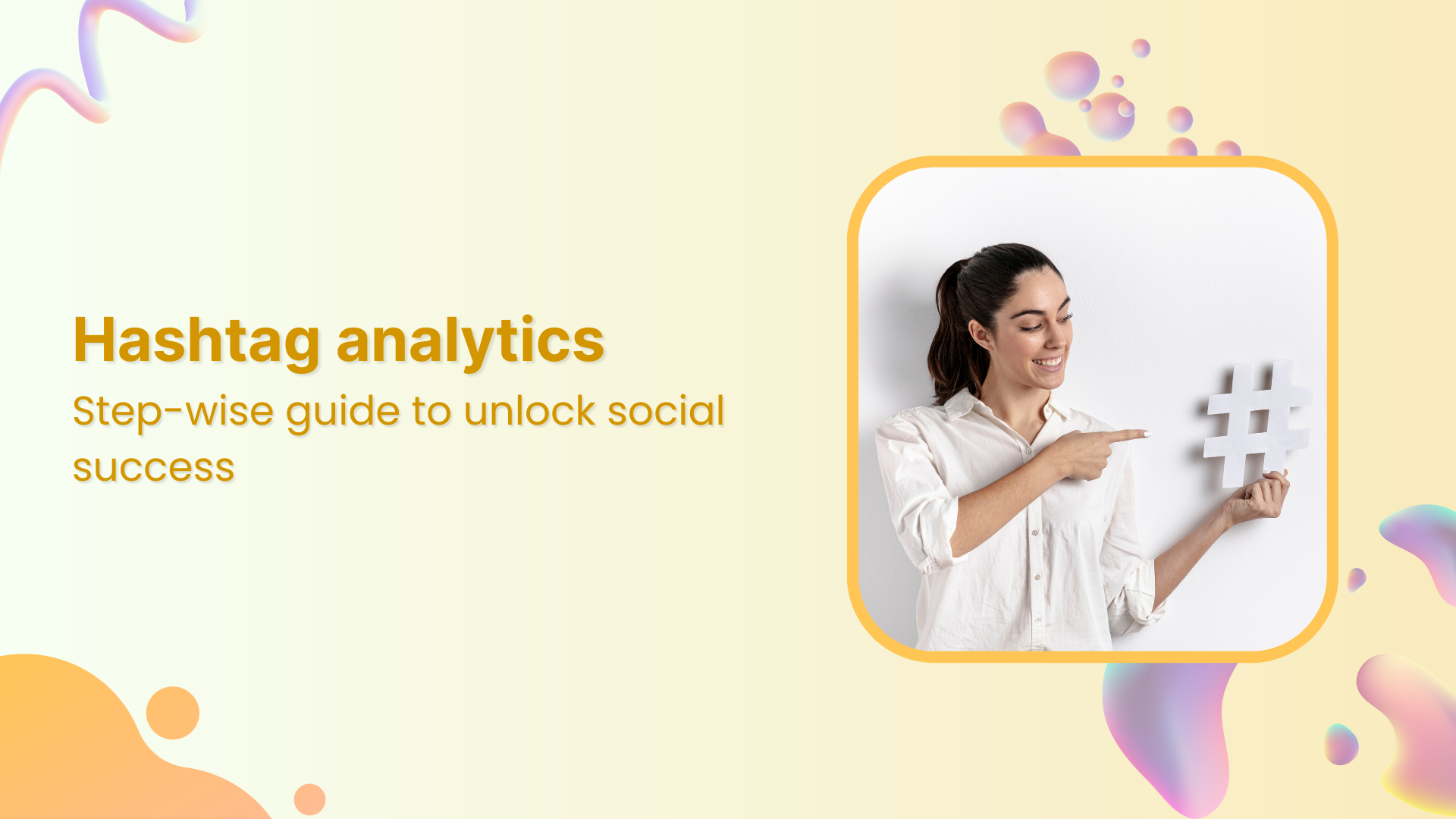Most users are aware of basic social media concepts like content, niche, collaboration, and monetization today, but only a few go one step further to explore advanced areas such as user retention, click-through rate, keywords, and hashtag analytics.
Social media is way more competitive than it was 10 years ago. It’s mainly because new demographics are exploring social media platforms every day. The easiest way to dominate the space is by getting a competitive edge over the majority users.
Social media hashtag analysis is one route to social media marketing success. Let’s explore hashtag analytics and how they can help social media users.
The easiest way to manage and grow your social channels.
Try ContentStudio for FREE
What are hashtag analytics?
Hashtag analytics are the statistical reporting of the hashtag performance data gathered by either a built-in analytics section of a social media dashboard or a standalone social media analysis tool.
Usually, hashtag analytics are available on demand when the user sends the query about a specific hashtag and the system processes numerous metrics, such as the number of times it’s used, relevant hashtags, popular hashtags (related to that), and others.
The purpose of studying hashtag analytics is to understand hashtags’ demand, usage, and popularity. Several hashtag analysis tools are available on the market that help marketers, influencers, and agencies choose the right hashtags.
For instance, Charles Dowding is a well-known British gardening influencer with over 40 years of experience in market gardening. He uses only a few Instagram hashtags:

If we analyze one of the hashtags from his Instagram post using a hashtag analysis tool, its report tells us that this hashtag has a reach of 1.2 million and 5.8k mentions in just 7 days.
All of these insights are only available due to hashtag analytics.
Why do you need hashtag analytics?
Hashtags are keywords or phrases that start with a hash symbol (#) and they are quite popular among social media users across all major social media platforms.
Hashtag analytics are statistical data about the hashtags users can access while analyzing their required hashtags. Let’s discuss why someone needs analytics hashtags.
Here are five reasons why you need hashtag analytics:
1. Identify the latest trends in the industry
It’s vital to keep an eye on the latest trends in your industry, and identifying industry-related social media hashtags is one of the ways to do that.
It starts with popping one popular hashtag in the hashtag analyzer and it will fetch more, related hashtags that represent the new trend in the space. You can handpick some trending hashtags every few months and stay relevant in the game.
2. Discover the effective hashtags used by influencers
Top creators and social media influencers are usually one step ahead of the general public. Keeping an eye on the influencer’s hashtags can turn things around for an average Joe.
Going through their hashtags can assist in discovering the most effective hashtags that can unleash further relevant hashtags through hashtag analysis tools. So, closely follow hashtags used by industry-related influencers.
3. Analyze the performance of certain hashtags
One of the reasons why we need hashtag analytics is to monitor the performance of the hashtags. There are multiple hashtag metrics that need to be analyzed, such as a number of posts, total impressions, reach, interactions, etc.
So, hashtag analytics provides users with all the performance data about the specific hashtags that they’re using or intend to use in the upcoming campaigns.
4. Keep a tab on the conversations in the niche
An essential reason to use hashtag analytics is to track conversations about a specific topic, niche, or trend across different social media platforms.
Social listening is a popular social media analytics feature available in social media management tools designed to keep a tab on conversions.
5. Find competitors to spy on in the future
Brands and influencers want to stay ahead of their competition on social media. It’s only possible if they spy on their competitors to learn more about their social media marketing strategies.
Analyzing their hashtags can provide vital insights into their social media content strategies. So, it’s another solid reason you need hashtag analytics for social media growth.
These are some of the many reasons why you need to pay close attention to hashtag analytics.
Key metrics to track in hashtag analytics
The primary purpose of a hashtag is to make the social media post discoverable across the platform. Hashtag analytics uncover essential data about each hashtag that help the creator or brand in making a decision about using the specific hashtag.
Here are some of the important metrics to track in hashtag analytics:
1. Frequency of use
One of the most important metrics to track in hashtag analytics is the total number of times the hashtag is used on the platform. A hashtag tracker dives deep into how often a hashtag appears in posts, helping you measure its popularity and overall usage.
2. Hashtag reach
Reach on social media represents how many people have seen the content on the platform. Hashtag reach measures the number of unique users who have seen content containing the hashtag, adding valuable insight into the overall hashtag analytics.
3. Engagement level
Engagement is one of the important social signals that tells the audience’s interest in the content. Evaluates the interactions (likes, comments, shares) on posts using the hashtag, indicating how well it drives user engagement and interactions.
4. Emotional sentiment
While many hashtags showcase care, empathy, love, affection, and warmth, some may send out a message of hate, anger, frustration, and disturbance – it’s called emotional sentiment. Usually, hashtags have either a positive, negative, or neutral tone associated with them, helping to gauge public perception and brand sentiment.
5. Audience demographics
A key aspect of hashtag analysis is the audience demographics. Some social media analytics showcase the age, gender, location, and other demographic traits of users interacting with the hashtag, providing a clearer understanding of your audience.
6. Branded hashtag performance
Branded hashtags are crucial to social media marketing. Hashtag analytics tools assist brands and influencers in monitoring the performance of branded hashtags along with other hashtags.
7. Hashtag impressions
Hashtag impressions indicate the number of hashtag appearances across the platform. In other words, it shows how many times posts with the hashtag appeared in users’ feeds, indicating the overall exposure and visibility of the content.
8. Influencer mentions
Influencer mentions are yet another important metric to track when analyzing hashtags. It depicts how many influencers have used this hashtag or how many times a hashtag is used by the influencer, depending on the hashtag analysis tool.
These are some of the essential hashtag metrics to watch when analyzing hashtags.
Best hashtag analytics tools
Here are five of the best hashtag analysis tools to try out:
1. ContentStudio’s social hashtag generators
ContentStudio is an excellent social media management dashboard that offers social publishing, scheduling, automation, curation, and analytics. Besides numerous built-in social media management features, it provides some free standalone tools.
Social hashtag generators are a set of AI-powered tools from ContentStudio that automatically create social media hashtag suggestions across different social platforms. To get started with hashtag generation, the user needs to select the right hashtag generator and proceed with it.
2. TweetBinder
TweetBinder is an X (formerly Twitter) analysis and tracking tool that helps marketers, influencers, and brands with Twitter historical data and brand mentions.
Undoubtedly, it makes it easier for marketers to access hashtag analytics for a social media marketing campaign. Companies and influencers capitalize on this tool to track brand mentions, campaign hashtags, and keywords on the Twitter platform.
3. Hashtagify
Hashtagify is a popular hashtag analysis platform that assists social media influencers, creators, and brands in discovering and analyzing the popularity of hashtags. The way it works is that the user inputs the hashtag and this tool dives deep into the insights and prepares a hashtag analysis report.
This tool can skyrocket social media marketing campaigns by helping users identify relevant hashtags for the Instagram and Twitter platforms.
4. Talkwalker
Talkwalker is a professional brand-tracking and social listening platform that tracks brand mentions, conversations, and content across all major social platforms.
One of its features is hashtag analysis and tracking. It lets brands and marketers track branded and other hashtags with ease.
5. Trackmyhashtag
Trackmyhashtag is a powerful hashtag tracking and analysis tool for X (Twitter). This tool is developed to help brands, influencers, and marketers analyze Twitter hashtags.
The noticeable features of this tool include hashtag tracking, hashtag analysis, influencer discovery, and historical data.
How to use hashtag analytics for strategy building
There are multiple use cases to capitalize hashtag analytics. Let’s go through some of the essential ones to get yourself equipped with the crucial information about the subject:
Plan campaigns using high-performing hashtags
The hashtags aren’t categorized per se, but there are some unsaid hashtag categories, for instance, competitive hashtags, short hashtags, long hashtags, high-performance hashtags, branded hashtags, and others.
When it comes to using hashtags across all social media platforms, it’s recommended to create a combination of multiple types of hashtags. However, using high-performance hashtags can help boost the social media campaign, whereas hashtag analytics can provide insights into effective, high-performance hashtags.
Adjust posting times and frequency
One of the use cases of hashtag analytics is to adjust social media posting times and frequency. Social media analysis tools can reveal the best time to post on social media platforms and how many times a user should post each day or week.
Hashtag analysis tools can identify the potential hashtags and determine the posting time and frequency of attraction across different social media platforms.
ContentStudio offers the best time to post feature like this.

Collaborate with relevant influencers
Hashtag analytics can lead to collaboration possibilities. The way it works is that it can help brands, agencies, and entrepreneurs discover influencers relevant to their niches and offer them deals for sponsored posts, branded content, or paid reviews.
Hashtags are an important aspect of search on social media platforms like X (Twitter), Instagram, TikTok, Facebook, and YouTube. Users use (hashtag + keyword) to search for mentions or content, then consume their content or reach out to them for further communication.
Related Read: How to find influencers to promote your small business in 2025
Track branded vs. community hashtags
An essential use case for hashtag analytics tools is to track branded and community hashtags. Different types of hashtags can be analyzed and compared in some of the hashtag analysis tools.
In fact, if there isn’t an option to do a head-to-head comparison of a branded hashtag and a community hashtag, then the user can manually compare the reach, impressions, and mentions of that hashtag.
Create lists of best-performing hashtags
One of the best uses of a hashtag analytics tool is to gather high-performance hashtags that match your brand strategy and prepare a list of those hashtags to use in the future.
Moreover, don’t hesitate to prepare multiple hashtags for social media campaigns. It’ll help you use suitable, high-performing hashtags whenever you need them.
Categorize hashtags based on the user intent
One of the use cases of hashtag analysis is that it allows marketers and influencers to categorize hashtags depending on the campaign’s purpose and the user’s intent. For instance, the user intent could be shopping during the holiday season or a discount on a specific product.
Moreover, it’ll ensure you use the right keywords at the right time. So, don’t underestimate the power of hashtag analytics to build a social media growth strategy.
Common hashtag analytics mistakes to avoid
Some mistakes are unavoidable, especially if you’re a newbie. However, learning about the common mistakes can save you time and energy. So, take a look at some of the common hashtag analytics mistakes that most beginner social media marketers make:
Using too many hashtags in the post
Using hashtags in social media posts is a must, but overloading a post with hashtags can make it look spammy and reduce engagement. It also dilutes the focus of your content and confuses the algorithm because it gets harder for the system to put the content in front of the right audience.
Go all-in on using irrelevant hashtags
Hashtags need to be specific and relevant to the topic. Using hashtags that don’t relate to your content may attract the wrong audience. It’ll eventually hurt your post’s performance and damage your credibility.
Ignoring performance trends over time
Following social media trends is no easy feat. However, hashtags can help social media content reach the right audience. Ignoring those trends can limit growth. Regular analysis helps refine your strategy and improve reach.
Not customizing hashtags per platform
Hashtags aren’t one-size-fits-all, meaning each platform favors different hashtag styles and limits. Using the same set everywhere can reduce effectiveness and look out of place. So, always customize your hashtag sets according to the social media platform.
Related Read: How to use hashtags for your social media posts?
Failing to track branded hashtags
Branded hashtags are hashtags that contain brand names. Companies and influencers use branded hashtags to increase brand awareness. You miss insights on user engagement and brand reach without tracking branded hashtags.
Over-relying on trending hashtags without context
Using trendy hashtags occasionally is alright, but jumping on trends without relevance can seem inauthentic. Audiences value meaningful content more than forced participation.
So, these are some commonly made hashtag mistakes from social media users across all social media platforms.
Final thoughts
Hashtags may not drive hundreds of thousands of visitors to your website or bring millions of new followers overnight, but they’re still very much relevant.
Hashtags are important because they stitch similar content together and allow users to see and access any content they like through hashtags.
Hashtag analytics, on the other hand, are crucial to understanding, implementing, and analyzing an effective social media hashtag strategy.
We’ve tried to explain this phenomenon in simple, plain English for an average user to grasp the concept of hashtags and capitalize on this very opportunity of hashtag analytics for the better.
FAQs about hashtag analytics
Here are some frequently asked questions about hashtag analytics:
What is hashtag analytics, and why is it important?
Hashtag analytics is the statistical data of a hashtag that any reputable hashtag analysis tool can fetch upon request. It’s particularly important to analyze the scope, demand, and importance of a social media hashtag.
Can I track hashtags in real time?
Anyone can track the latest posts associated with a hashtag on social media platforms, but the numbers might be delayed for some reason.
Are there free tools for hashtag analytics?
ContentStudio offers several free hashtag generator tools for businesses, influencers, and social media experts.
How do I choose the right hashtags based on analytics?
Once all the indicators, such as mentions, reach, impressions, and sentiments, look good and the relevance is there, the hashtag can be added to the list of hashtags to use in a social media post.
